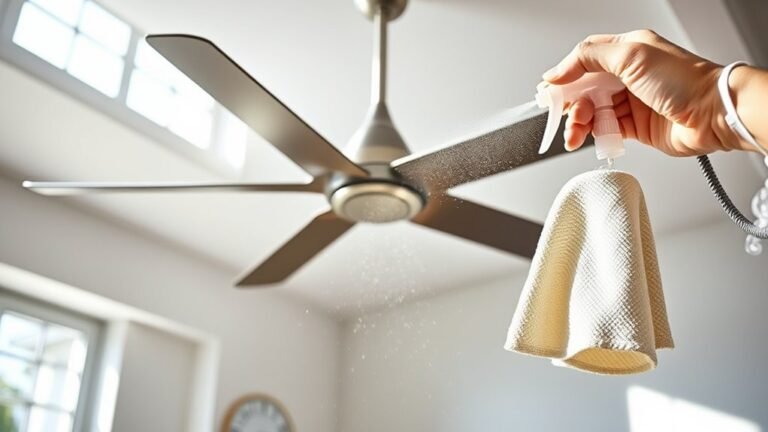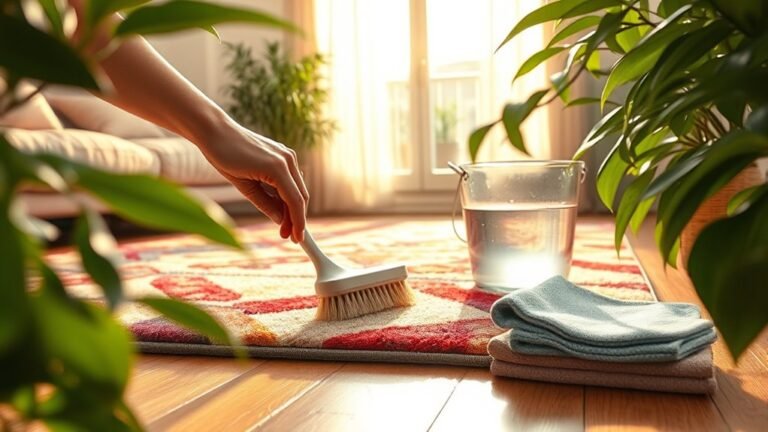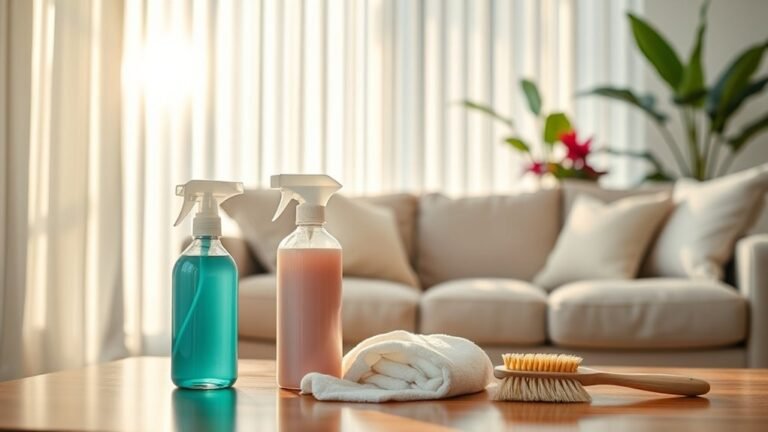How to Use Everyday Items for Unexpected Cleaning Tasks
You can use everyday items to tackle unexpected cleaning tasks easily. Coffee filters keep glass streak-free, while old toothbrushes clean tight spots like grout or faucets. Baking soda acts as a gentle scrubber, and white vinegar removes hard water stains naturally. Lemon juice brightens surfaces and deodorizes, while dryer sheets pick up dust and pet hair efficiently. Rubber gloves help with hair removal, and toothpaste polishes silver. Keep going to uncover more clever cleaning hacks with household staples.
Using Coffee Filters to Shine Glass and Mirrors

A simple coffee filter can be surprisingly effective for cleaning glass and mirrors. You might not realize it, but using coffee filters offers several benefits compared to paper towels or cloths. They’re lint-free, so you won’t end up with annoying streaks or fibers left behind. When you want your mirrors to shine effortlessly, coffee filter benefits include their gentle texture that won’t scratch delicate surfaces. For mirror cleaning tips, just spray your preferred cleaner, then wipe with a coffee filter in a circular motion. This method saves you time and frustration, giving you clear, streak-free reflections without any extra hassle. Embracing this simple tool gives you more freedom from complicated routines and costly cleaning products, making your daily cleaning easier and more satisfying.
Repurposing Old Toothbrushes for Cleaning Tight Spaces
When you need to clean hard-to-reach spots, old toothbrushes can become invaluable tools. Their small heads and firm bristles are perfect for toothbrush cleaning and tight space scrubbing. Instead of tossing them, repurpose these brushes to free yourself from stubborn dirt in corners, vents, and grout lines.
| Surface | Best Toothbrush Type | Cleaning Tip |
|---|---|---|
| Keyboard | Soft-bristled | Use gentle, short strokes |
| Window Tracks | Medium-bristled | Spray cleaner beforehand |
| Faucet Fixtures | Stiff-bristled | Focus on crevices |
Baking Soda as a Multi-Purpose Scrubbing Agent

Baking soda works wonders as a versatile scrubbing agent you probably already have in your kitchen. Its gentle abrasiveness offers effective cleaning without harsh chemicals, making it a top choice for those who value freedom from toxins. To maximize baking soda benefits, try these scrubbing techniques:
- Sprinkle baking soda on surfaces, then scrub with a damp sponge for grime removal.
- Mix with water to create a paste for tackling stubborn stains.
- Use with a soft brush to clean delicate items without scratching.
- Combine with lemon juice for a natural deodorizing scrub.
White Vinegar for Removing Hard Water Stains
You’ll find white vinegar’s acidity is perfect for breaking down hard water stains quickly. To get the best results, soak a cloth in vinegar and apply it directly to the affected area. With a little time and some gentle scrubbing, those stubborn spots will start to disappear.
Vinegar’s Acidity Benefits
Because of its natural acidity, white vinegar is a powerful and affordable solution for tackling hard water stains. Its vinegar benefits come from acetic acid, which breaks down mineral deposits without harsh chemicals. When you understand vinegar applications, you realize how versatile this simple product is for freeing your home from stubborn buildup.
Here’s why vinegar’s acidity works so well:
- Dissolves calcium and lime deposits quickly
- Safe on most surfaces, preventing damage
- Eco-friendly alternative to chemical cleaners
- Leaves surfaces sparkling without residue
Application Tips
Understanding how vinegar’s acidity tackles hard water stains helps you use it more effectively. When applying white vinegar, soak a cloth or sponge and press it against your stained kitchen utensils or surfaces. Let it sit for a few minutes to break down mineral buildup, then wipe clean. For tougher spots, gently scrubbing with a vinegar-soaked brush can free stubborn deposits without harsh chemicals. You can also add vinegar to your laundry as a natural fabric softener—this helps remove mineral deposits from clothes and prevents stiffness caused by hard water. Just remember, avoid prolonged vinegar contact on sensitive materials to keep your freedom from damage. By mastering these simple application tips, you’ll enjoy sparkling results with minimal effort and maximum control over your cleaning routine.
Stain Removal Process
Although hard water stains can be stubborn, white vinegar offers a simple and effective way to dissolve them. Understanding different stain types helps you choose the right removal techniques, and white vinegar excels on mineral deposits left by hard water. Here’s how you can use it:
- Soak a cloth in white vinegar and apply it directly to the stain.
- Let it sit for 10-15 minutes to break down minerals.
- Scrub gently with a non-abrasive sponge or brush.
- Rinse thoroughly with water and dry.
This approach frees you from harsh chemicals and complicated products, making your cleaning routine straightforward and eco-friendly. Embrace this natural method to tackle hard water stains confidently, knowing you’re using a versatile, everyday item effectively.
Lemon Juice to Brighten and Deodorize Surfaces
You can use lemon juice to naturally remove stains and brighten your surfaces without harsh chemicals. It also works wonders to neutralize odors, leaving your space smelling fresh. Plus, it’s safe for many surfaces, making it a versatile cleaning option you’ll appreciate.
Natural Stain Removal
When stains start to dull your surfaces, lemon juice can be a surprisingly effective solution to brighten and deodorize them. It’s one of those natural stain solutions that’s both powerful and safe, using what you already have at home. Lemon juice works wonders on stains by breaking down grime and lifting discoloration with its natural acidity.
To make the most of this common household remedy, try these tips:
- Apply lemon juice directly to the stain and let it sit for 5-10 minutes.
- Combine lemon juice with baking soda for a gentle abrasive scrub.
- Rinse thoroughly with warm water to avoid residue.
- Use lemon juice on cutting boards, countertops, and fabric stains for fresh results.
You don’t need harsh chemicals when natural stain removal is this simple and freeing.
Odor Neutralizing Effects
Beyond tackling stains, lemon juice also excels at neutralizing odors, making your home smell fresh and clean. When you squeeze lemon juice onto surfaces, it works as a natural odor absorbing agent, neutralizing unpleasant smells rather than just covering them up. This means you’re not masking scents with chemicals but actually eliminating them. The bright, citrus aroma of lemon adds a subtle, invigorating scent that lifts the atmosphere without overpowering it. You can apply lemon juice directly on cutting boards, countertops, or trash bins to brighten and deodorize simultaneously. It’s a simple way to reclaim your space and enjoy the freedom that comes with a naturally fresh environment, all while avoiding synthetic fragrances or harsh cleaners. Lemon juice truly gives your surfaces a new lease on life.
Safe Surface Applications
Although lemon juice is a powerful natural cleaner, it’s important to know which surfaces it’s safe to use on. To enjoy effective cleaning without damage, focus on these safe surface applications. Lemon juice works wonders for brightening and deodorizing while keeping your freedom to use natural solutions.
Use lemon juice on:
- Countertops made of sealed granite or quartz
- Stainless steel appliances to remove fingerprints
- Glass surfaces for a streak-free shine
- Wooden cutting boards (rinse well after use)
Avoid using lemon juice on unsealed stone, marble, or delicate wood, as its acidity can cause etching or discoloration. By sticking to these safe surface applications, you’ll keep things bright and fresh, harnessing lemon juice’s power without risking damage.
Newspaper for Streak-Free Window Cleaning
If you want sparkling windows without streaks, using newspaper is a surprisingly effective method. The newspaper technique lets you clean glass with no streaks or lint left behind, unlike some cloths or paper towels. Plus, it’s an eco friendly cleaning hack—reusing old newspapers reduces waste and avoids chemical-laden products. Simply spray your window cleaner or a vinegar-water mix on the glass, then crumple a piece of newspaper and wipe in circular motions. The ink and texture work together to lift grime and polish the surface. This method frees you from relying on disposable wipes or synthetic cloths, aligning perfectly with your desire for simplicity and sustainability. Give it a try and enjoy gleaming windows that reflect your eco-conscious freedom.
Dryer Sheets to Remove Dust and Pet Hair

When you need a quick and easy way to remove dust and pet hair from furniture or clothing, dryer sheets can be a surprisingly effective tool. Their anti-static properties make pet hair removal a breeze, while also picking up dust without spreading it around. Plus, you don’t need special cleaners—just grab a sheet and get to work. The dryer sheet benefits go beyond laundry, giving you freedom to tackle cleaning in unexpected places.
Here’s how dryer sheets help you clean:
- Attract dust and pet hair effortlessly
- Reduce static cling on fabrics and upholstery
- Freshen surfaces with a subtle scent
- Reusable for multiple quick clean-ups
Keep a pack handy and enjoy the freedom of easy, everyday cleaning!
Toothpaste for Polishing Silver and Removing Scratches
One simple household item you’ve probably overlooked is toothpaste, which can work wonders for polishing silver and removing minor scratches. Its mild abrasives make toothpaste effective for restoring luster without harsh chemicals. To use, apply a small amount of non-gel toothpaste to a soft cloth and gently rub it onto your silver items. This DIY silver polishing method not only saves money but also frees you from reliance on specialized products. After rubbing, rinse the silver thoroughly with warm water and dry it with a clean cloth. You’ll notice the shine return and light scratches diminish. Embracing toothpaste effectiveness in this way gives you a straightforward, liberating approach to caring for your silverware using what you already have at home.
Using Rubber Gloves to Pick Up Pet Hair
Using a pair of rubber gloves can make picking up pet hair surprisingly easy and efficient. Simply put on the rubber gloves, slightly dampen them, and run your hands over surfaces where pet hair tends to stick. The hair clings to the gloves, letting you gather it quickly without sticky rollers or lint brushes.
Here’s why rubber gloves are your best friend against pet hair:
- They attract hair through static and slight moisture.
- Gloves let you reach tricky spots like upholstery crevices.
- You can rinse off hair easily and reuse gloves.
- They save time compared to vacuuming or sweeping.
With rubber gloves, tackling pet hair becomes a quick, freeing task instead of a chore. You’ll enjoy cleaner spaces and more time doing what you love.
Frequently Asked Questions
Can Everyday Items Damage Delicate Surfaces During Cleaning?
You might think everyday items are harmless, but they can damage delicate surfaces if you’re not careful. Surface sensitivity varies, so it’s key to take cleaning precautions before you start. Always test a small, hidden spot first to avoid scratches or discoloration. By understanding your surface’s needs and using gentle techniques, you’ll protect your belongings and enjoy the freedom to clean confidently without worry or damage.
How Do I Safely Store Homemade Cleaning Mixtures?
Think of your homemade cleaning mixtures as hidden treasures—handle them with care. You’ll want to use airtight storage containers to keep them fresh and safe from spills. Don’t forget labeling mixtures clearly; it’s like giving each potion its own name, so you know what’s inside at a glance. Store them out of reach of kids and pets, and keep freedom in your routine by organizing your space thoughtfully.
Are These Household Cleaning Hacks Safe for Children and Pets?
You’ve got to prioritize child safety and pet safety when using any cleaning hacks. Even natural ingredients can be harmful if ingested or touched, so always store mixtures out of reach. Make sure the area is well-ventilated and never mix chemicals that could create toxic fumes. Keeping your little ones and furry friends safe lets you enjoy the freedom of a clean home without worry or restrictions.
How Effective Are Natural Cleaning Items Compared to Commercial Products?
You’ll find that natural alternatives offer great cleaning efficacy for many everyday tasks, giving you freedom from harsh chemicals. While they might not always match commercial products in heavy-duty grime removal, they’re often gentler and safer for your home and the environment. You can confidently use things like vinegar or baking soda for routine cleaning, enjoying effective results without compromising your desire for a healthier, more natural lifestyle.
Can These Cleaning Methods Be Used Outdoors or on Furniture?
You might be surprised how versatile these natural cleaning methods are! When it comes to outdoor surfaces, they’ve got your back—just test a small spot first. For furniture materials, whether it’s wood, fabric, or metal, you can usually use gentle mixtures, but some need extra care. You’re free to experiment, just remember: patience and a little trial go a long way. Embrace the freedom of knowing you’re cleaning smart and safe!






